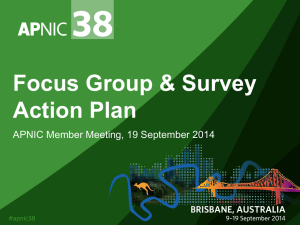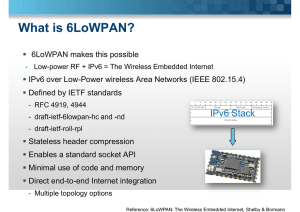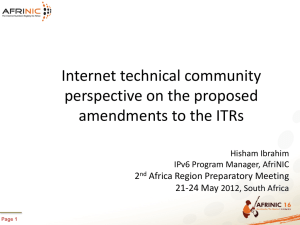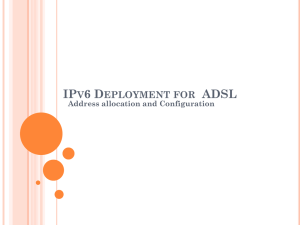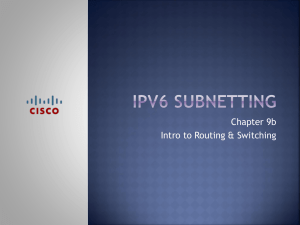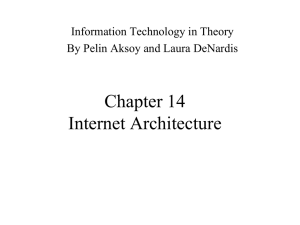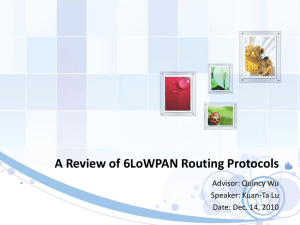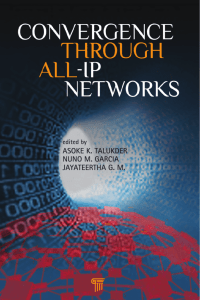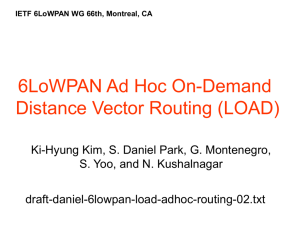ppt
advertisement
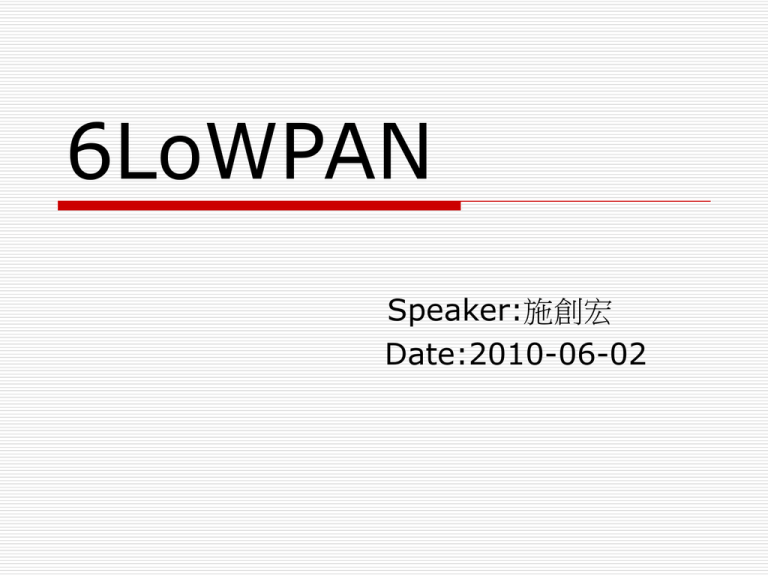
6LoWPAN Speaker:施創宏 Date:2010-06-02 Outline Overview What is a Smart Object IETF (Internet Engineer Task Force) ISA (Instrumentation, Systems, and Automation Society) Problem of 6LoWPAN Vision Reference Overview 6LoWPAN is an acronym of IPv6 over Low power Wireless Personal Area Networks. A simple low throughput wireless network comprising typically low cost and low power devices. Common topologies include – star, mesh, and combinations of star and mesh. The Phy and MAC layers conform to IEEE 802.15.4-2003 standard 6LoWPAN Characteristics Small packet size (127Byte) 16-bit short or IEEE 64-bit extended media access control addresses Low bandwidth. (250kbps) Low power, typically battery operated Relatively low cost What is “The Internet Of Things ?” It is fundamentally the idea of connecting SmartObjects to enable a myriad of new applications ! It is in fact about connecting Smart Objects using IP: either via a (virtual) private network OR the Internet. What is a Smart Object? An intelligent tag (RFID), A sensor: device that measures a physical quantity and converts it to a analog or digital signal: power consumption and quality, vibration of an engine, pollution, temperature, CO, motion detection, … An Actuator: device that controls a set of equipment (e.g. control and/or modulates the flow of a gas or liquid, control electricity distribution, perform a mechanical operation) Any combination of the above features to form a more complex entity. Typical Applications Protocol and Architecture High number of proprietary or semi-closed solutions:Zigbee, Z-Wave, Xmesh, SmartMesh/TSMP, … at many layers (physical, MAC, L3) and most chip vendor claim to be compatible with their own standard. Many non-interoperable “solutions” addressing specific problems. Different Architectures, Different Protocols Which protocol and architecture ? The architecture and protocol MUST have a specific properties. Based on open standards: for interoperability, cost reduction and innovation … Flexibility in many dimensions: Support a wide range of media Support a wide range of devices Always favor global than local optimum. Highly secure Plug & Play Scalable IP: The perfect fit ! Based on open standards: for interoperability, cost reduction and innovation Flexibility in many dimensions: Support a wide range of media Support a wide range of devices Always favor global than local optimum: Highly secure Plug & Play Scalable Open standard: The Internet Engineering Task Force. Flexibility in many dimensions: Serial, SDH, FR, ATM, Ethernet, Wireless, Optical … From cell phone to high speed routers Always favor global than local optimum: “IP if good enough for everything: from email to video to realtime protocols” A very secure and well proven Biliions of connected devices IP to the Sensors New services and applications M2M, remote management New Markets Process Control for factories Control and Automation for home, building, cities Larger Core Market Open standards to the sensor Lower cost More connected devices and new applications A wider Internet Shaping the future Internet of things Why IPv6? Advantage More suitable for higher density Statelessness mandated. No NAT necessary. Possibility of adding innovative techniques such as location aware addressing. Defect Larger address width(128bit). Complying to IPv6 node requirements. IETF 網際網路標準主要是由網際網路工程任務小組(Internet Engineer Task Force, IETF)負責研究發展和制定的。IETF是一個屬性相當開放的組織,是由來自於全世 界關心網際網路技術發展的網際網路設計者、營運業者、使用者和研究人員 所組 成。最特別的是,IETF由眾多名為「工作群組」(Working Group, WG) 的委員 會所組成,這些工作群組絕大多數都是針對特殊問題或程序而建立起來的,所以都 是以短暫性的存續運作為常態,只要工作目標完成就會終止該工作群組的運作。目 前在IETF的網站上,可以看到各個工作群組的相關資料和運作現況。 6LoWPAN The Working Group will generate the necessary documents to ensure interoperable implementations of 6LoWPAN networks and will define the necessary security and management protocols and constructs for building 6LoWPAN networks. 6lowpan will work closely with the Routing Over Low power and Lossy networks (roll) working group which is developing IPv6 routing solutions for low power and lossy networks (LLNs). ROLL ROLL: defining the routing solution within the LLN (Low power and Lossy Network). Description of Working Group Low power and Lossy networks (LLNs) are made up of many embedded devices with limited power, memory, and processing resources. They are interconnected by a variety of links, such as IEEE 802.15.4, Bluetooth, Low Power WiFi, wired or other low power PLC (Powerline Communication) links. LLNs are transitioning to an end-to-end IP-based solution to avoid the problem of non-interoperable networks interconnected by protocol translation gateways and proxies. Protocol Translation Gateways Complex to manage, expensive! Lack of end to end routing consistency, Multi-topology routing, management, security, … ISA Instrumentation, Systems, and Automation Society is a non-profit technical society for engineers, technicians, businessmen, educators and students, who work, study or are interested in industrial automation. It was originally known as the Instrument Society of America. ISA provides leadership and education in the instrumentation and automation industries, assisting engineers, technicians, and research scientists, as well as many others, in keeping pace with the rapidly changing industry. ISA100.11a Working Group Charter This project addresses: Low energy consumption devices, with the ability to scale to address large installations. Wireless infrastructure, interfaces to legacy infrastructure and applications, security, and network management requirements in a functionally scalable manner. Robustness in the presence of interference found in harsh industrial environments and with legacy systems. Coexistence with other wireless devices anticipated in the industrial work space. Interoperability of ISA100 devices. ISA100.11a, IP technology ISA 100.11a endorsed 6LoWPAN IPv6 packets but not stack (ND, ICMP) Internet Control Message Protocol(TCP/IP協 定中IP協定的上層,通過ICMP可對發信人進行通知 和檢測通訊前對方節點是否存在) Backbone Router draft @ 6LoWPAN Proposing an IPv6 based best practice To promote full IPv6 in ISA100.11a And WSN in general by contagion Problem No method exists to make IP run over IEEE 802.15.4 networks Stacking IP and above layers “as is” may not fit within one 802.15.4 frame IPv6 40 octets, TCP 20 octets, UDP 8 octets + other layers (security, routing, etc) leaving few bytes for data Not all adhoc routing protocols may be immediately suitable for LoWPAN DSR (Dynamic Source Routing) may not fit within a packet. AODV (Ad hoc On-Demand Distance Vector) needs more memory. Limited configuration and management necessary Security for multi hop needs to be considered Challenges of LoWPAN Impact Analysis Addressing Routing Security Network management Low power (1-2 years lifetime on batteries) Storage limitations, low overhead Periodic sleep aware routing, low overhead Simplicity (CPU usage), low overhead Periodic sleep aware management, low overhead Low cost (<$10/unit) Stateless address generation Small or no routing tables Ease of Use, simple bootstrapping Space constraints Low bandwidth (<300kbps) Compressed addresses Low routing overhead Low packet overhead Low network overhead High density (<2-4? units/sq ft) Large address space – IPv6 Scalable and routable to *a node* Robust Easy to use and scalable IP network interaction Address routable from IP world Seamless IP routing Work end to end from IP network Compatible with SNMP, etc Goals Support stateless auto configuration of IPv6 addressing. In all cases, reuse existing protocols before creating new ones . Specify/use header compression schemes. Specify encoding/decoding for device discovery mechanisms. Define security mechanisms, security configuration. Vision Building automation Today: Highly fragmented market Limited to no IP/wireless Potential for: open standards ISA100.11a extension Applications Energy savings Regulation Security Vision Smart cities Today: Slowing development of mesh networks Few applications (surveillance, muni info) Potential for: WIFI/WIMAX integrated Mesh ISA100.11a IPv6 networking Applications Energy/Water savings Water leak detection Traffic Regulation Physical Security Air quality monitoring Vision Home Automation Today: Lot of wires Some powerline (homeplug) Potential for: WIFI Low Power 802.15.4 IP home networking Applications Energy/Water savings Home security Home Safety Remote healthcare Air quality monitoring The golden path Vision Sensors and actuators using Internet technology. That’s Billions of devices in the next 10 years. Enabling new services and applications. Steps IP for automation open standards (ISA100.11a). IP for LLN (Low power and lossy networks) (6LoWPAN and ROLL). Reference http://solomon.ipv6.club.tw/Course/ProtocolEn gineering/internet_of_things.pdf http://solomon.ipv6.club.tw/Course/ProtocolEn gineering/cisco_thubert_m2mworkshop.pdf http://solomon.ipv6.club.tw/Course/ProtocolEn gineering/6lowpan-4.ppt
